Program Details Speaker
Cheryl E Praeger
University of Western Australia
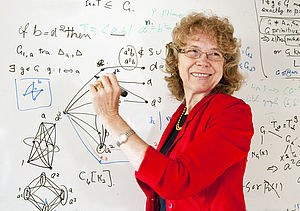 Cheryl E Praeger is Winthrop Professor of Mathematics at the University of Western Australia and was the foundation Director of UWA’s Centre for Mathematics of Symmetry and Computation. She was educated in Brisbane, Australia and completed her doctorate at Oxford in the UK. She is a Fellow of the Australian Academy of Science. Cheryl Praeger was the first woman President of the Australian Mathematical Society, and so far she is the only mathematician and only woman to be named WA Scientist of the Year. Her research area is Group Theory and Combinatorics. She has been a Member-at-Large of the International Mathematical Union Executive Committee since 2007, and is Vice President of the International Commission for Mathematical Instruction.
Cheryl E Praeger is Winthrop Professor of Mathematics at the University of Western Australia and was the foundation Director of UWA’s Centre for Mathematics of Symmetry and Computation. She was educated in Brisbane, Australia and completed her doctorate at Oxford in the UK. She is a Fellow of the Australian Academy of Science. Cheryl Praeger was the first woman President of the Australian Mathematical Society, and so far she is the only mathematician and only woman to be named WA Scientist of the Year. Her research area is Group Theory and Combinatorics. She has been a Member-at-Large of the International Mathematical Union Executive Committee since 2007, and is Vice President of the International Commission for Mathematical Instruction.
Ingrid Daubechies
Duke University
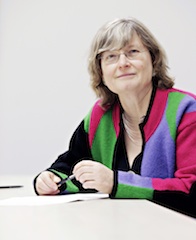 Ingrid Daubechies was born in Houthalen, Belgium. She obtained her Ph.D. in theoretical physics in 1980; beginning in 1981, she spent two postdoctoral years in the Physics Department at Princeton University, after which she returned to Belgium to continue her research career at the Vrije Universiteit Brussel, funded by a fellowship from the NFWO (Belgian National Foundation for Scientific Research). She visited the Courant Institute at New York University in 1986; this is where she made her best-known discovery: based on quadrature mirror filter-technology she constructed compactly supported continuous wavelets that would require only a finite amount of processing, in this way enabling wavelet theory to enter the realm of digital signal processing. In July 1987, Daubechies joined the Murray Hill AT&T Bell Laboratories' New Jersey facility. From 1994 to 2010, Daubechies was a professor at Princeton University, where she was active especially within the Program in Applied and Computational Mathematics. She was the first female full professor of Mathematics at Princeton. Daubechies currently works as a James B. Duke Professor of Mathematics at Duke University.
Ingrid Daubechies was born in Houthalen, Belgium. She obtained her Ph.D. in theoretical physics in 1980; beginning in 1981, she spent two postdoctoral years in the Physics Department at Princeton University, after which she returned to Belgium to continue her research career at the Vrije Universiteit Brussel, funded by a fellowship from the NFWO (Belgian National Foundation for Scientific Research). She visited the Courant Institute at New York University in 1986; this is where she made her best-known discovery: based on quadrature mirror filter-technology she constructed compactly supported continuous wavelets that would require only a finite amount of processing, in this way enabling wavelet theory to enter the realm of digital signal processing. In July 1987, Daubechies joined the Murray Hill AT&T Bell Laboratories' New Jersey facility. From 1994 to 2010, Daubechies was a professor at Princeton University, where she was active especially within the Program in Applied and Computational Mathematics. She was the first female full professor of Mathematics at Princeton. Daubechies currently works as a James B. Duke Professor of Mathematics at Duke University.
She has received several prizes for her research, starting with the (Belgian) Louis Empain Prize for Physics in 1984; others include the American Mathematical Society Steele Prize for Exposition (1994) and Seminal Research (2011), the AMS Ruth Lyttle Satter prize (1997), the Eduard Rhein Foundation Basic Research Award (2000), the James Kilby Medal of the IEEE Signal Processing Society (2011), the Okawa Prize (2011), the Nemmers prize (2012), and the 2012 BBVA Foundation Frontiers of Knowledge Award in the Basic Sciences category (jointly with David Mumford). She was elected to the United States National Academy of Sciences in 1998. In 2000 Ingrid Daubechies became the first woman to receive the National Academy of Sciences Award in Mathematics for excellence in published mathematical research. She gave a plenary lecture at the International Congress of Mathematicians (1994). She is presently serving a 4-year term (2011-2014) as President of the International Mathematical Union.
Hyungju Park
Pohang University of Science and Technology
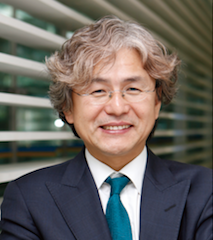 Hyungju Park was born in Buyeo, Korea, and received his BS in physics at Seoul National University in 1986, and then received his Ph.D. at the University of California, in Berkeley 1995. He studied algebraic geometry at the graduate school, gradually moving to computational aspect of algebraic geometry and applications to signal processing. Professor Hyungju Park is currently working at the Department of Mathematics, Pohang University of Science and Technology (POSTECH), after spending several years at Korea Institute for Advanced Study (KIAS). Since the fall of 2013, he is the director of Center for Applications of Mathematical Principles (CAMP) at National Institute for Mathematical Sciences (NIMS) in Daejeon, Korea. He is also the chairman of Organizing Committee of International Congress of Mathematics (ICM) 2014.
Hyungju Park was born in Buyeo, Korea, and received his BS in physics at Seoul National University in 1986, and then received his Ph.D. at the University of California, in Berkeley 1995. He studied algebraic geometry at the graduate school, gradually moving to computational aspect of algebraic geometry and applications to signal processing. Professor Hyungju Park is currently working at the Department of Mathematics, Pohang University of Science and Technology (POSTECH), after spending several years at Korea Institute for Advanced Study (KIAS). Since the fall of 2013, he is the director of Center for Applications of Mathematical Principles (CAMP) at National Institute for Mathematical Sciences (NIMS) in Daejeon, Korea. He is also the chairman of Organizing Committee of International Congress of Mathematics (ICM) 2014.
C. Herbert Clemens
University of Utah
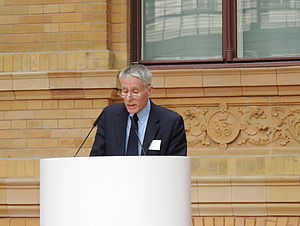 Professor Clemens career combines a strong interest in research in the mathematical area of algebraic geometry with a lifelong interest in undergraduate and precollege mathematics education and in nurturing mathematics and mathematics education in the developing world. After his Ph.D. degree in 1966, he spent two years as a Peace Corps volunteer in Santiago, Chile. Subsequently he spent two vears as a visiting member of the Institute for Advanced Study, Princeton, NJ, before returning to Chile as a Fulbright Fellow in 1970. He then spent five years as an assistant, then associate professor at Columbia University in New York City before joining the Mathematics Department of the University of Utah in 1975. In 2002, Professor Clemens left Utah to accept a professorship in mathematics and mathematics education at Ohio State University. He has received honorary degrees from the University of Turin, Italy, and the University of Santiago, Chile. From 2007-2010 Professor Clemens chaired the U.S. National Committee on Mathematics and has served on the U.S. National Committee on Mathematics Instruction. From 1999 through 2006 he directed the Park City Mathematics Institute, an Institute for Advanced Study sponsored summer program of mathematics and mathematics teaching at the secondary, undergraduate, graduate and research level. He has served on Governor's Committees on Mathematics Education in both Utah and Ohio. In the area of mathematics development and education, Professor Clemens is currently a member of the High School Mathematics Standing Committee of the U.S. National Assessment for Educational Progress (NAEP) and is Secretary of the International Mathematical Union's Commission for Developing Countries. He is also currently back at the University of Utah, coordinating the Math for America Utah program.
Professor Clemens career combines a strong interest in research in the mathematical area of algebraic geometry with a lifelong interest in undergraduate and precollege mathematics education and in nurturing mathematics and mathematics education in the developing world. After his Ph.D. degree in 1966, he spent two years as a Peace Corps volunteer in Santiago, Chile. Subsequently he spent two vears as a visiting member of the Institute for Advanced Study, Princeton, NJ, before returning to Chile as a Fulbright Fellow in 1970. He then spent five years as an assistant, then associate professor at Columbia University in New York City before joining the Mathematics Department of the University of Utah in 1975. In 2002, Professor Clemens left Utah to accept a professorship in mathematics and mathematics education at Ohio State University. He has received honorary degrees from the University of Turin, Italy, and the University of Santiago, Chile. From 2007-2010 Professor Clemens chaired the U.S. National Committee on Mathematics and has served on the U.S. National Committee on Mathematics Instruction. From 1999 through 2006 he directed the Park City Mathematics Institute, an Institute for Advanced Study sponsored summer program of mathematics and mathematics teaching at the secondary, undergraduate, graduate and research level. He has served on Governor's Committees on Mathematics Education in both Utah and Ohio. In the area of mathematics development and education, Professor Clemens is currently a member of the High School Mathematics Standing Committee of the U.S. National Assessment for Educational Progress (NAEP) and is Secretary of the International Mathematical Union's Commission for Developing Countries. He is also currently back at the University of Utah, coordinating the Math for America Utah program.
Ngô Bao Châu
University of Chicago
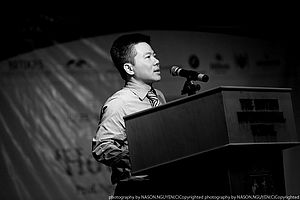 Ngô Bao Châu was born in Hanoi in 1972. Graduating from the Ecole Normale Superieure de Paris, he obtained his PhD in 1997 from the Universite Paris-Sud under the supervision of Gérard Laumon. He became Professor at University Paris-Sud in 2004. In the same year, he received the title of professor in Vietnam. From 2007 to 2010 he visited the Institute for Advanced Study in Princeton, New Jersey. He is now teaching as Francis and Rose Yuen Distinguished Sevice Professor at the University of Chicago
Ngô Bao Châu was born in Hanoi in 1972. Graduating from the Ecole Normale Superieure de Paris, he obtained his PhD in 1997 from the Universite Paris-Sud under the supervision of Gérard Laumon. He became Professor at University Paris-Sud in 2004. In the same year, he received the title of professor in Vietnam. From 2007 to 2010 he visited the Institute for Advanced Study in Princeton, New Jersey. He is now teaching as Francis and Rose Yuen Distinguished Sevice Professor at the University of Chicago
In 2004, he received jointly with Laumon the Clay research Award. In 2007, he received prizes from the Paris academy of sciences and the Oberwolfach Institute. In 2010 he received the Fields Medal for proving the fundamental lemma for automorphic forms proposed by Robert Langlands and Diana Shelstad.
He has been involved since 2003 in coordinating and promoting mathematics in Vietnam. Since 2011, he is acting as scientific director of the newly founded Vietnam Institute for Advanced Study and helps implementing the Vietnam national program for the promotion of mathematics.
Edward Lungu
University of Botswana
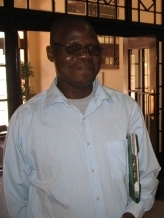 Edward Lungu is a professor of mathematics at the University of Botswana, in Gabarone, Botswana. He got his first degree in 1975 from the University of Zambia, and then went to the University of Bristol where he got a Master's degree and a Ph.D. in 1980.
Edward Lungu is a professor of mathematics at the University of Botswana, in Gabarone, Botswana. He got his first degree in 1975 from the University of Zambia, and then went to the University of Bristol where he got a Master's degree and a Ph.D. in 1980.
Edward Lungu has been described as a "fundamental person" in the development of teaching and research in applied mathematics in Southern Africa. As founder and leader of the Southern Africa Mathematical Sciences Association (SAMSA) and later of AMMSI (the Millenium Initiative) he has organized, encouraged, supervised, and led by his personal example in teaching and research. For Botswana itself, Edward Lungu has developed models in: hydrology (Botswana relies on storing rainfall), ecology (domestic livestock as well as wildlife are keys to the economy), and epidemiology (to understand the progression of HIV/AIDS and how to help the victims). The series of his recent papers in mathematical biosciences model the differential progression of HIV/AIDS based on characteristics of patients and the care they receive. In developing mathematical education and research, Edward Lungu has been described as a "giant force". In 2011 he was awarded the Su Buchin Prize of the International Council of Industrial and Applied Mathematics (ICIAM), which recognizes an outstanding contribution by an individual in the application of mathematics to emerging economies and human development, in particular at the economic and cultural level in developing countries.
Eric Hanushek
Hoover Institution of Stanford University
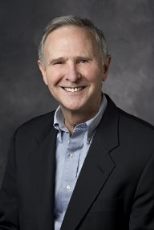 Eric Hanushek is the Paul and Jean Hanna Senior Fellow at the Hoover Institution of Stanford University. He has been a leader in the development of economic analysis of educational issues with his work frequently entering into the design of national and international educational policy. His research spans such diverse areas as the impact of teacher quality, high stakes accountability, equity and efficiency in school finance, and class size reduction along with the role of cognitive skills in international growth and development. His pioneering analysis measuring teacher quality through growth in student achievement forms the basis for current research into the value-added of teachers and schools. He has authored or edited twenty books along with over 200 articles. He is a Distinguished Graduate of the United States Air Force Academy and completed his Ph.D. in economics at the Massachusetts Institute of Technology.
Eric Hanushek is the Paul and Jean Hanna Senior Fellow at the Hoover Institution of Stanford University. He has been a leader in the development of economic analysis of educational issues with his work frequently entering into the design of national and international educational policy. His research spans such diverse areas as the impact of teacher quality, high stakes accountability, equity and efficiency in school finance, and class size reduction along with the role of cognitive skills in international growth and development. His pioneering analysis measuring teacher quality through growth in student achievement forms the basis for current research into the value-added of teachers and schools. He has authored or edited twenty books along with over 200 articles. He is a Distinguished Graduate of the United States Air Force Academy and completed his Ph.D. in economics at the Massachusetts Institute of Technology.
KunMo CHUNG
Minister of Science & Technology (12th , 15th), The Republic of Korea [Former minister]
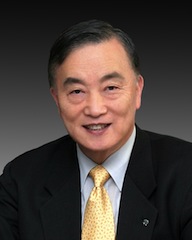 Dr. KunMo Chung, born in 1939 in Korea, is an internationally known energy engineer and science policy specialist. He served twice as Minister of Science and Technology in the South Korean government when Korea was rapidly developing. Professor Chung also served as President and CEO of the Korean Academy of Science and Technology. Dr. Chung was formerly President of Korea Power Engineering Company and has served as Chairman and CEO of the Korea Science and Engineering Foundation. Internationally, Dr. Chung held posts as President of the General Conference of International Atomic Energy Agency of the United Nations, Vice Chairman of the World Energy Council, and Chairman of the International Nuclear Energy Academy.
Dr. KunMo Chung, born in 1939 in Korea, is an internationally known energy engineer and science policy specialist. He served twice as Minister of Science and Technology in the South Korean government when Korea was rapidly developing. Professor Chung also served as President and CEO of the Korean Academy of Science and Technology. Dr. Chung was formerly President of Korea Power Engineering Company and has served as Chairman and CEO of the Korea Science and Engineering Foundation. Internationally, Dr. Chung held posts as President of the General Conference of International Atomic Energy Agency of the United Nations, Vice Chairman of the World Energy Council, and Chairman of the International Nuclear Energy Academy.
As an educator, Dr. Chung has been Professor of Energy Engineering at MIT, Polytechnic Institute of New York (PINY), Korea Advanced Institute of Science and Technology (KAIST), Ajou University, Ecole Polytechnique Federale de Lausanne (EPFL) and George Mason University. Dr. Chung is credited with the establishment of KAIST, which has become one of the leading science and engineering universities.
Dr. Chung is currently Fellow of the American Nuclear Society, Fellow of the Korean Academy of Science and Technology, Foreign Member of the Swedish Royal Academy of Applied Science and Engineering, Foreign Member of the U.S. National Academy of Engineering, and Fellow of the International Nuclear Energy Academy. He is a co-founder of the International Risk Governance Council (IRGC) in Geneva.
Currently, Dr. Chung is Distinguished Invited Professor at Ajou University in Korea and Distinguished Research Professor at George Mason University in Virginia, USA. He also serves as Advisor to Korea Electric Power Corporation. He is a member of the Kenyan National Economic and Social Council and a member of the International Advisory Board to UAE.
Rubí E. Rodríguez
Universidad de La Frontera
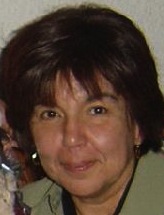 Rubí E. Rodríguez is a Professor of Mathematics at Universidad de La Frontera, in Temuco, Chile. She completed her Ph. D. at Columbia University in 1981, and was President of the Chilean Mathematical Society from 2006 to 2010. Her research area is complex geometry: abelian varieties and group actions.
Rubí E. Rodríguez is a Professor of Mathematics at Universidad de La Frontera, in Temuco, Chile. She completed her Ph. D. at Columbia University in 1981, and was President of the Chilean Mathematical Society from 2006 to 2010. Her research area is complex geometry: abelian varieties and group actions.
She has a long-standing interest and a certain record of work in advancing mathematics and mathematics education in less developed countries, particularly in LatinAmerica.
In an effort to counteract local isolation, many years ago she and her colleagues founded the Iberoamerican Congress on Geometry with the mission of outreach to the Iberoamerican community of countries. This meeting is held every three years in rotating locations: Chile, Mexico, Brazil, Spain and the US. By bringing together geometers from the region, it has had a significant effect of development of the subject there.
More recent activities include co-chairing the organizing committee for the first Joint Meeting between the American Mathematical Society and the Chilean Mathematical Society, held in Chile in 2010. This joint meeting attracted many young mathematicians from the region, who have created permanent links since.
Over the years, she has offered learning seminars and courses in Mexico, Ecuador, and Peru, and has mentored several Ph. D. and Master students.
Gunther Uhlmann
University of Washington in Seattle
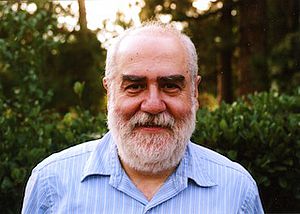 Gunther Uhlmann is the Walker Family Endowed Professor of Mathematics at the University of Washington in Seattle, USA. He is Corresponding Member of the Chilean Academy of Sciences. He got his Licentiatura degree at the Faculty of Sciences of the Universidad de Chile in Santiago, Chile, in 1973 and the PhD at MIT, USA, in 1976. He has maintained close ties with Chilean Mathematicians, visiting Chile many times, organizing conferences in Chile, giving minicourses and talks at workshops and also public lectures.
Gunther Uhlmann is the Walker Family Endowed Professor of Mathematics at the University of Washington in Seattle, USA. He is Corresponding Member of the Chilean Academy of Sciences. He got his Licentiatura degree at the Faculty of Sciences of the Universidad de Chile in Santiago, Chile, in 1973 and the PhD at MIT, USA, in 1976. He has maintained close ties with Chilean Mathematicians, visiting Chile many times, organizing conferences in Chile, giving minicourses and talks at workshops and also public lectures.
Bernt Karsten Øksendal
University of Oslo, Norway
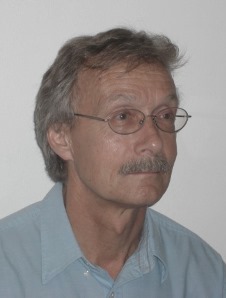 Bernt Karsten Øksendal (born 1945 in Fredrikstad) is a Norwegian mathematician. He performed his undergraduate studies at the University of Oslo. He obtained his PhD from University of California, Los Angeles in 1971. In 1991, he was appointed as a professor at the University of Oslo. In 1992, he was also appointed as an adjunct professor at the Norwegian School of Economics and Business Administration, Bergen, Norway.
Bernt Karsten Øksendal (born 1945 in Fredrikstad) is a Norwegian mathematician. He performed his undergraduate studies at the University of Oslo. He obtained his PhD from University of California, Los Angeles in 1971. In 1991, he was appointed as a professor at the University of Oslo. In 1992, he was also appointed as an adjunct professor at the Norwegian School of Economics and Business Administration, Bergen, Norway.
His main field of interest is stochastic analysis, including stochastic control, optimal stopping, stochastic ordinary and partial differential equations and applications, particularly to physics, biology and finance. For his contributions to these fields, he was awarded the Nansen Prize in 1996 and the University of Oslo Research Price in 2014. He has been a member of the Norwegian Academy of Science and Letters since 1996. He was elected as a member of the Norwegian Royal Society of Sciences in 2002.
In 2005 Øksendal was one of the initiators, and the Chair, of the European Science Foundation Program "Advanced Mathematical Methods in Finance" (AMaMeF). The program lasted 5 years and involved 16 European member countries.
In 1996 Øksendal was one of the initiators, and has since been the Norwegian coordinator, of the Norwegian - Southern African cooperation program "Mathematics and its Applications in Southern Africa", based in Zimbabwe (sponsored by NUFU/Norad). This program lasted till 2006, when it was taken over by a similar NOMA/Norad program based in Tanzania, also coordinated by him. He was a visiting professor at the University of Botswana in the autumn 1994, and he has since then taught courses in stochastic analysis in Botswana, Zimbabwe and South Africa on several occasions.
In 2009 Øksendal was awarded an Advanced Grant for 5 years from the European Research Council (ERC) for the project "Innovations in Stochastic Analysis and Applications" (Innostoch). As of January 2014, he has over 200 published works, including 14 books.
Adewale Solarin
National Mathematical Centre (NMC) Abuja, Nigeria
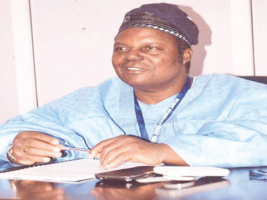 Adewale Solarin (FMAN, FASI) is a Professor of Mathematics and the current Director and Chief Executive Officer of the National Mathematical Centre (NMC) in Abuja, Nigeria. He is also the President of African Mathematical Union. Until his appointment as the Director of the NMC he was the Coordinator of the Tertiary Institutions Students Mathematics Competitions, the Mathematics Programme and the Mental Mathematics for Basic Education Programme. He has also previously served as Principal Trainer of the Nigerian Team for the International Mathematics Olympiads at the NMC. At the University of Agriculture, Prof Solarin was a Deputy Vice-Chancellor (Dec 2004 – Dec 2006); Director of Academic Planning (2000 – 2004) and Head of the Department of Mathematical Science (1997 – 2000). Prof Solarin, who holds a Ph.D. in Mathematics and a background in Statistics, has been in the university system in Nigeria and outside the country for 38 years. He has supervised many M.Sc. and Ph.D candidates, among them: Professor (Mrs.) V. O. Chiboka, Professor C. K. Ayo, Prof. O. J. Adeniran, Prof. A. A. A. Agboola and Prof. J. N. Mojekwu. He was one of the initiators of the inauguration of the Quality Control Society of Nigeria (QCSON) in 1990. Consequently, he became the first National President of the Society in 1990 to 1994.
Adewale Solarin (FMAN, FASI) is a Professor of Mathematics and the current Director and Chief Executive Officer of the National Mathematical Centre (NMC) in Abuja, Nigeria. He is also the President of African Mathematical Union. Until his appointment as the Director of the NMC he was the Coordinator of the Tertiary Institutions Students Mathematics Competitions, the Mathematics Programme and the Mental Mathematics for Basic Education Programme. He has also previously served as Principal Trainer of the Nigerian Team for the International Mathematics Olympiads at the NMC. At the University of Agriculture, Prof Solarin was a Deputy Vice-Chancellor (Dec 2004 – Dec 2006); Director of Academic Planning (2000 – 2004) and Head of the Department of Mathematical Science (1997 – 2000). Prof Solarin, who holds a Ph.D. in Mathematics and a background in Statistics, has been in the university system in Nigeria and outside the country for 38 years. He has supervised many M.Sc. and Ph.D candidates, among them: Professor (Mrs.) V. O. Chiboka, Professor C. K. Ayo, Prof. O. J. Adeniran, Prof. A. A. A. Agboola and Prof. J. N. Mojekwu. He was one of the initiators of the inauguration of the Quality Control Society of Nigeria (QCSON) in 1990. Consequently, he became the first National President of the Society in 1990 to 1994.
Edy Tri Baskoro
Institut Teknologi Bandung, ITB
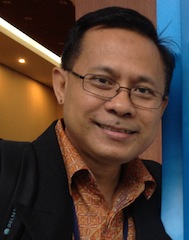 Born in Jombang, Indonesia Edy Tri Baskoro received his B.Sc degree in mathematics from the Institut Teknollogi Bandung (ITB) Indonesia in 1987, and his PhD degree from the University of Newcastle, Australia in 1996. Since then he has held a senior academic position at ITB, and in 2006 was granted a professorship in mathematics. He has also served as an adjunct professor at the University of Newcastle and the Abdus Salam School of Mathematical Sciences, GC University, Lahore, Pakistan. His main research interests are graph theory and combinatorics and he is a pioneer in these fields in Indonesia. For his contributions to these fields he has been awarded the Habibie Award in Basic Science Research (2009), the Australian Alumni Award for Excellence in Education (2009), and the Extraordinary Intellectual Quality Award (2010). He also plays a significant role in the development of mathematics in South East Asia and is currently the President of the South East Asian Mathematical Society (2014-2015), and a member of Scientific Committee of CIMPA (since 2009). He also contributes to the development of national standards for education from primary to higher education in Indonesia as the member of the Board of National Standards for Education. As of May 2014, he has published over 100 research papers and produced 17 PhD graduates.
Born in Jombang, Indonesia Edy Tri Baskoro received his B.Sc degree in mathematics from the Institut Teknollogi Bandung (ITB) Indonesia in 1987, and his PhD degree from the University of Newcastle, Australia in 1996. Since then he has held a senior academic position at ITB, and in 2006 was granted a professorship in mathematics. He has also served as an adjunct professor at the University of Newcastle and the Abdus Salam School of Mathematical Sciences, GC University, Lahore, Pakistan. His main research interests are graph theory and combinatorics and he is a pioneer in these fields in Indonesia. For his contributions to these fields he has been awarded the Habibie Award in Basic Science Research (2009), the Australian Alumni Award for Excellence in Education (2009), and the Extraordinary Intellectual Quality Award (2010). He also plays a significant role in the development of mathematics in South East Asia and is currently the President of the South East Asian Mathematical Society (2014-2015), and a member of Scientific Committee of CIMPA (since 2009). He also contributes to the development of national standards for education from primary to higher education in Indonesia as the member of the Board of National Standards for Education. As of May 2014, he has published over 100 research papers and produced 17 PhD graduates.
José Seade
Mathematics Institute of UNAM in Mexico City
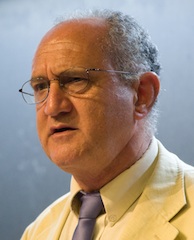 José Seade was born in Mexico City and got his first degree in mathematics from the National University of Mexico (UNAM) in 1976. He got his Masters and D. Phil. degrees in mathematics at the University of Oxford, U. K., in 1977 and 1980, respectively. His main fields of research are singularities theory and discrete groups representations. For his contributions on these topics he was appointed member of the Academy of Sciences for the Developing World (TWAS) in 1993, and he was awarded the Ferran Sunyer I Balaguer prize in 2005 and 2012. During 1986-1987 he was President of the Mexican Mathematical Society, and as such he was founder of the Mexican Mathematical Olympiad. He was a member of the Scientific Council of UMALCA, the Latin American and Caribbean Union of Mathematicians, during 2001-2009, and he was responsible for the organization of the 2ndLatin American Congress of Mathematicians, held in Cancun, Mexico, in 2002. He organized too the first EMALCA school, which took place in Cuernavaca, Mexico, in 2001. He is currently Director of the Mathematics Institute of UNAM in Mexico City, a member of the Executive Committee of UMALCA since 2009, and the Scientific Coordinator of the Solomon Lefschetz International Laboratory of Mathematics, associated to the CNRS (France) and CONACYT (Mexico).
José Seade was born in Mexico City and got his first degree in mathematics from the National University of Mexico (UNAM) in 1976. He got his Masters and D. Phil. degrees in mathematics at the University of Oxford, U. K., in 1977 and 1980, respectively. His main fields of research are singularities theory and discrete groups representations. For his contributions on these topics he was appointed member of the Academy of Sciences for the Developing World (TWAS) in 1993, and he was awarded the Ferran Sunyer I Balaguer prize in 2005 and 2012. During 1986-1987 he was President of the Mexican Mathematical Society, and as such he was founder of the Mexican Mathematical Olympiad. He was a member of the Scientific Council of UMALCA, the Latin American and Caribbean Union of Mathematicians, during 2001-2009, and he was responsible for the organization of the 2ndLatin American Congress of Mathematicians, held in Cancun, Mexico, in 2002. He organized too the first EMALCA school, which took place in Cuernavaca, Mexico, in 2001. He is currently Director of the Mathematics Institute of UNAM in Mexico City, a member of the Executive Committee of UMALCA since 2009, and the Scientific Coordinator of the Solomon Lefschetz International Laboratory of Mathematics, associated to the CNRS (France) and CONACYT (Mexico).
Ragni Piene
University of Oslo, Norway
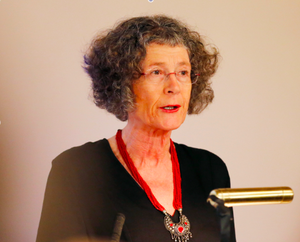 Ragni Piene is a professor of mathematics at the University of Oslo, Norway. She holds a B.Sc. and M.Sc. from the University of Oslo, a DEA from the University of Paris (Orsay), and a PhD from Massachusetts Institute of Technology. Her field of research is algebraic geometry. She is a member of the Norwegian Academy of Science and Letters, the Royal Norwegian Society of Sciences and Letters, and the Academia Europaea, and she is a fellow of the American Mathematical Society.
Ragni Piene is a professor of mathematics at the University of Oslo, Norway. She holds a B.Sc. and M.Sc. from the University of Oslo, a DEA from the University of Paris (Orsay), and a PhD from Massachusetts Institute of Technology. Her field of research is algebraic geometry. She is a member of the Norwegian Academy of Science and Letters, the Royal Norwegian Society of Sciences and Letters, and the Academia Europaea, and she is a fellow of the American Mathematical Society.
She was a member of the Executive Committee of the International Mathematical Union from 2003 to 2010. She is currently a member of IMU's Commission for Developing Countries and a co-organizer of the MENAO symposium. For the last four years she has been the chair of the Abel Committee.
Magalie Lebreton-Traoré
UNESCO
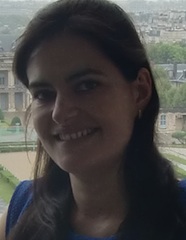 Magalie Lebreton-Traoré, French-Malian citizen, carried out her PhD studies at the Max Planck Institute for Cell Biology and Genetics in Germany.
Magalie Lebreton-Traoré, French-Malian citizen, carried out her PhD studies at the Max Planck Institute for Cell Biology and Genetics in Germany.
After completion of her PhD in December 2008, she joined UNESCO, where she currently works as a Programme Specialist in the Division of Science Policy and Capacity Building.
In the last 5.5 years, she has worked on the implementation of several projects and activities in the framework of the International Basic Sciences Programme (IBSP) aiming at strengthening capacities in research and education in different fields of science and mathematics, especially in developing countries.
Polly Sy
University of the Philippines Diliman
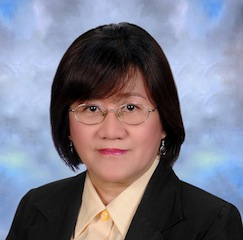 Polly Wee Sy is a professor at the University of the Philippines. She holds a M.Sc. and Ph.D. from the University of the Philippines and a D. Sc from the Nagoya University, Japan. She was a recipient of the 1988 Outstanding Young Scientist Award from the National Academy of Science and Technology of the Philippines (NAST) and 1992 Science Prize (in mathematics) from NAST and Third World Academy of Science (TWAS). For her contributions to mathematics, she was given an Achievement Award by the National Research Council of the Philippines. Her research interests are partial differential equations and mathematics biology.
Polly Wee Sy is a professor at the University of the Philippines. She holds a M.Sc. and Ph.D. from the University of the Philippines and a D. Sc from the Nagoya University, Japan. She was a recipient of the 1988 Outstanding Young Scientist Award from the National Academy of Science and Technology of the Philippines (NAST) and 1992 Science Prize (in mathematics) from NAST and Third World Academy of Science (TWAS). For her contributions to mathematics, she was given an Achievement Award by the National Research Council of the Philippines. Her research interests are partial differential equations and mathematics biology.
She is a member of the IMU- Commission for Developing Countries and editor of the regional report on Mathematics in South East Asia: Challenges and Opportunities which will be published right before MENAO.
Sir Partha Dasgupta
Cambridge University
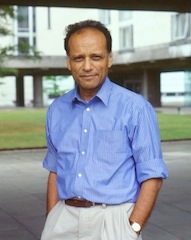 Partha Dasgupta, was born in Dhaka (at that time in India) and educated in Delhi (B.Sc. Hons, in Physics, 1962, University of Delhi), and Cambridge (B.A. Hons. in Mathematics, 1965, and Ph.D. in Economics, 1968 at the University of Cambridge). He is the son of the noted economist Amiya Dasgupta (1903-1992). Dasgupta is Frank Ramsey Emeritus Professor of Economics at the University of Cambridge and Fellow of St John's College, Cambridge. He taught at the London School of Economics during 1971-1984 and moved to the University of Cambridge in 1985 as Professor of Economics, where he served as Chairman of the Faculty of Economics in 1997-2001. During 1989-92 he was also Professor of Economics, Professor of Philosophy, and Director of the Program in Ethics in Society at Stanford University; and during 1991-97 he was Chairman of the (Scientific Advisory) Board of the Beijer International Institute of Ecological Economics, Stockholm. He was a co-founder of the South Asian Network for Development and Environmental Economics (SANDEE), Kathmandu. Professor Dasgupta's research interests have covered welfare and development economics, the economics of technological change, population, environmental and resource economics, the theory of games, the economics of undernutrition, and the economics of social capital. He is a Fellow of the British Academy and of the Royal Society; Member of the Pontifical Academy of Social Sciences; and Foreign Member of the US National Academy of Science, the American Academy of Arts and Sciences, and the American Philosophical Society. He was awarded the Volvo Environment Prize (2002) and the Zayed International Environment Prize (2011).
Partha Dasgupta, was born in Dhaka (at that time in India) and educated in Delhi (B.Sc. Hons, in Physics, 1962, University of Delhi), and Cambridge (B.A. Hons. in Mathematics, 1965, and Ph.D. in Economics, 1968 at the University of Cambridge). He is the son of the noted economist Amiya Dasgupta (1903-1992). Dasgupta is Frank Ramsey Emeritus Professor of Economics at the University of Cambridge and Fellow of St John's College, Cambridge. He taught at the London School of Economics during 1971-1984 and moved to the University of Cambridge in 1985 as Professor of Economics, where he served as Chairman of the Faculty of Economics in 1997-2001. During 1989-92 he was also Professor of Economics, Professor of Philosophy, and Director of the Program in Ethics in Society at Stanford University; and during 1991-97 he was Chairman of the (Scientific Advisory) Board of the Beijer International Institute of Ecological Economics, Stockholm. He was a co-founder of the South Asian Network for Development and Environmental Economics (SANDEE), Kathmandu. Professor Dasgupta's research interests have covered welfare and development economics, the economics of technological change, population, environmental and resource economics, the theory of games, the economics of undernutrition, and the economics of social capital. He is a Fellow of the British Academy and of the Royal Society; Member of the Pontifical Academy of Social Sciences; and Foreign Member of the US National Academy of Science, the American Academy of Arts and Sciences, and the American Philosophical Society. He was awarded the Volvo Environment Prize (2002) and the Zayed International Environment Prize (2011).